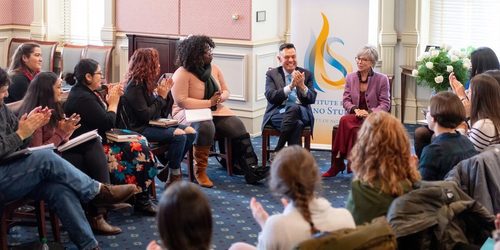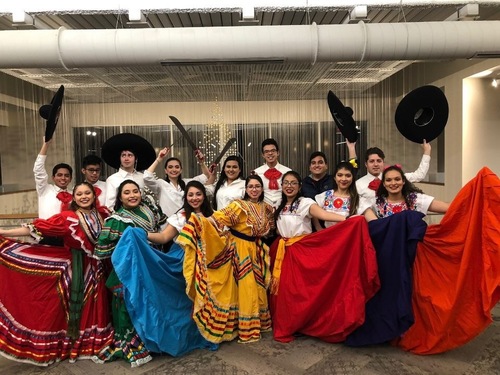When Luis Ricardo Fraga was studying for his Ph.D. in the early 1980s, there was no such thing as Latino studies in the field of political science as it exists today. In graduate school, a professor pulled Fraga aside one day to tell him that he would not learn very much by studying communities that don’t have any political power. Fraga stuck with it, though, because he wanted to understand why Latino communities didn’t have power and what could be done to give them more opportunities.
Today, Fraga is the director of Notre Dame’s Institute for Latino Studies (ILS), a cross-curricular department that serves about 500 students, both undergraduate and graduate. Fraga, now the Rev. Donald P. McNeill, C.S.C. Professor of Transformative Latino Leadership, has been working with the ILS since 2014 as a professor of political science. He believes it exemplifies something that sets Notre Dame apart from other selective institutions.
“The institute is consistent with the original mission of the school,” says Fraga. “[The University] was meant to serve a predominantly Catholic working-class immigrant community. In the United States today, that group is Latino. I see Notre Dame as a tremendously aspirational institution that is mission-based, and my goal at the ILS is to help set the institute in a direction that is consistent with the original mission of ND.”
The ILS, which was established in 1999, offers about 20 classes each semester at the graduate and undergraduate levels, and they draw from a number of different disciplines. Courses are taught by 32 affiliated faculty members from departments including anthropology, sociology, political science, history, theology and Spanish. While all of the affiliated faculty come from the College of Arts and Letters, Fraga says he sees more and more students from varying colleges and majors declare a Latino studies minor or supplementary major.

“We get students interested in broadening their understanding of growing diversity and understanding how that affects their work as a lawyer, or as a physician, or as a businessperson,” says Fraga. “Most of our students are not Latino students, either. We have a wonderful cultural mix. At graduation, they all say that their focus in ILS is what grounded them in their other majors and in learning who they were.”
Along with the rest of the United States, it has taken time for Notre Dame to recognize the importance of Latino communities’ role in the future of our country. Fraga worked at Notre Dame from 1986-1991, then left to teach at Stanford University and the University of Washington. When he was invited back to Notre Dame’s political science department in 2014, he accepted because he saw a change in Notre Dame’s commitment to creating a robust Latino studies program.
“When I was here the first time, I had great difficulty getting Notre Dame to understand how important Latino communities were to the country and ND’s future,” says Fraga. “It’s totally different now, which is why I came back. I saw how the University had committed itself to better understanding these communities and the opportunities to build a more democratic, more responsive, and more understanding church and nation.”
So much had changed from the time when Fraga’s advisor pulled him aside in the early 1980s to tell him that Latino communities were not worth studying. Fraga has now been the director of the ILS for two years, and was a co-director for two years before that.
The institute offers a unique opportunity for undergraduate students through its Latino Studies Scholars Program, a merit-based, four-year scholarship offered to students with a commitment to leadership and working with Latino communities. The scholarship program, which Fraga founded four years ago, is available to students regardless of racial or ethnic background, and is the first and only of its kind in the country.
While the scholarship program has served 19 total students to date, Fraga hopes to work up to offering 16 scholarships per year, or more than 60 students on campus at a time working toward supporting Latino communities.
“No one else is doing this, even in places with a high Latino population,” says Fraga. “If we can get that many students invested in this, it would be a game-changer. We’re training and building the next generation of leaders in Latino communities across the United States, and we hope this will be copied by other institutions.”

The ILS also has a summer internship for undergraduate students called the Cross-Cultural Leadership Program, through which selected students are housed in Chicago, Los Angeles, Washington, D.C., or San Juan, Puerto Rico to work in a Latino-focused organization. Though the ILS began focusing mostly on Latino communities within the United States, it has branched out to include study of the Latino diaspora in South and Central America.
In addition, the ILS promotes community engagement work. A collaboration with the Alliance for Catholic Education and English as a New Language helped establish a two-way English-Spanish immersion program at Holy Cross Elementary School in South Bend. In 2011, Fraga was named to an advisory committee on educational excellence for Hispanics in Barack Obama’s white house. He specifically focused on postsecondary education, and contributed to the commissions of policy proposals and ideas that would help Latino students and families to succeed.
One of Fraga’s goals is to contribute more directly to creating a pipeline of students in the Latino studies field. This can be a challenge. “Jobs are scarce; getting tenure isn’t easy; there are a lot of issues one has to deal with when one wants to study Latino communities. But if more of us don’t accept the responsibility for trying to do that, the country is at risk of falling into hostility that we see today,” says Fraga.
He thinks academics have a critical role to play. “That’s God’s work—to try to bring communities together, to share resources, to hold people accountable, and to do it in a way that tries to build understanding. I can’t think of any better place to do this than at Notre Dame.”
Originally published by at admissions.nd.edu on September 24, 2020.